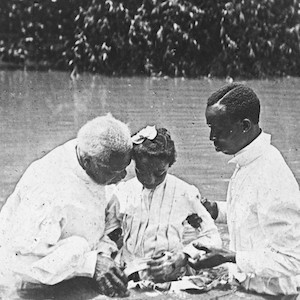Gender
Dona Marina, Cortes’ Translator: Nonfiction, Octavio Paz
This essay, which seeks to explain modern Mexican sensibilities by examining the phrases “hijos de la chingada” and “malinchista,” presents La Malinche as violated woman—part victim, part traitor to her nation.
Imperialism in North Africa: Law, Code of Personal Status
In 1956 one of the most revolutionary family law codes in the Arab or Islamic world was proclaimed in the newly independent Tunisian state which, paradoxically, had not suffered a political revolution in the way that colonial Algeria would.

New York Public Library Digital Collections
The NYPL Digital Collection provides access to over 755,000 images digitized from primary sources and printed rarities, including illuminated manuscripts, vintage posters, illustrated books, and printed ephemera.Imperialism in North Africa: Interview, Tewhida Ben Sheikh
Tewhida Ben Sheikh [1909-2010] was the first North African Muslim woman to earn a medical degree from the Faculty of Medicine in Paris, in 1936, while Tunisia was still under colonial rule.
Imperialism in North Africa: Autobiography, Fadhma Amrouche
Fadhma Amrouche was the illegitimate daughter of an impoverished, illiterate Berber peasant woman.
Imperialism in North Africa: Report, M. Coriat
North Africa has long been home to ancient, diverse communities of Jews, originally from Spain, Italy, Palestine, or elsewhere.
Imperialism in North Africa: Newspaper, Hubertine Auclert
From the middle of the 19th century on, European women settled in colonial empires in Asia and Africa in greater numbers. Some, even many, attempted to effect changes for the good of colonized women.

Robert E. Williams Photographic Collection
These arresting images document telling elements of African Americans' daily lives in Georgia during this period.Imperialism in North Africa: Letters, Lalla Zaynab
In North Africa, Muslim and Jewish women’s quotidian religiosity was expressed in popular observances and festivals preserved chiefly, but not exclusively, in oral traditions.
Discussion of Women’s Political Clubs and Their Suppression, 29–30 October 1793
On 29 October 1793, a group of women appeared in the National Convention to complain that female militants had tried to force them to wear the red cap of liberty as a sign of their adherence to the Revolution, but they also presented a petition demanding the suppression of the women’s club behind